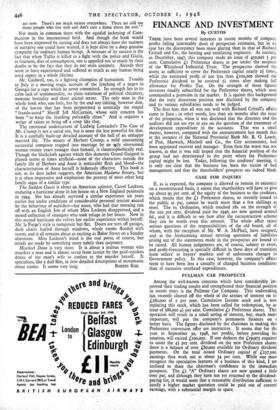FINANCE AND INVESTMENT
By CUSTOS
THERE have been several instances in recent months of company profits falling lamentably short of prospectus estimates, but in no case has the discrepancy been more glaring than in that of Richard Crittall and Co., the heating and ventilating engineers. As recently as December, 1947, this company made an issue of 450,000 5 per cent. Cumulative Li Preference shares at par under the auspices of the Whitehead Industrial Trust. The prospectus showed the assets as sufficient to cover the Preference capital nearly 21 times, while the estimated profit of not less than Lioo,000 showed the Preference dividend to be covered 51 times after making full allowance for Profits Tax. On the strength of those figures investors readily subscribed for the Preference shares, which soon commanded a premium in the market. It is against this background that the truly disastrous position now disclosed by the company and its various subsidiaries needs to be judged.
The first hint that all was not well with Richard Crittall's affairs came in June ; in other words, less than six months after the issue of the prospectus, when it was disclosed that the directors and the auditors did not see eye to eye on the question of the treatment of development expenditure in the accounts. That was a small matter, however, compared with the announcement last month that at the instance of the National Provincial Bank Mr. R. G. Leach, of Peat, Marwick, Mitchell and Co., the City accountants, had been appointed receiver and manager. Even then the worst was not known, in that it was still hoped that the financial position of the group had not deteriorated to the point where the Preference capital might be lost. Today, following the creditors' meeting, it is only too clear that the business has been the victim of bad management and that the shareholders' prospects are indeed bleak.
CASE FOR INQUIRY
If, as is expected, the company is allowed to remain in existence on a reconstructed basis, it seems that shareholders will have to give up about 95 per cent. of the equity of the business to the creditors, which means that the Li Preference. shares, so recently issued to the public at par, cannot be worth more than a few shillings at most. The is. Ordinaries, which touched 18s. on the strength of the too per cent. dividend paid for 1946, are now quoted around 6d., and it is difficult to see how after the reconstruction scheme they can be worth even this amount. The whole affair raises serious questions of the responsibilitites of the old board, all of whom, with the exception of Mr. W. A. McPhail, have resigned, and at the forthcoming annual meeting questions of liabilities arising out of the statements made in the prospectus are bound to be raised. All human judgements are, of course, subject to error, and profit-forecasting is specially difficult in these days of transition from sellers' to buyers' markets and of unforeseen changes in Government policy. In this case, however, the company's affairs seem to have been less a casualty of changed business conditions than of excessive overhead expenditures.
PULLMAN CAR PROSPECTS Among the well-known concerns which have considerably im- proved their trading results and strengthened their financial position in recent years is the Pullman Car Company. This undertaking has recently cleared off the whole of the arrears of interest on its L38o,000 of 5 per cent. Cumulative Income stock and is now replacing this stock, which has been called for redemption, by an issue of 386,000 41 per cent. Cumulative Li Preference shares. This operation will result in a small saving of interest, but, much more important, will put the company's permanent finances on a better basis. The figures disclosed by the chairman in making this Preference conversion offer are instructive. It seems that for the year to September 3o, 1948, net profits, before providing for taxation, will exceed Lioo,000. If one deducts the £19,975 required to cover the 41 per cent. dividend on the new Preference shares, there is a balance of over £8o,000 available for Ordinary dividend payments. On the total issued Ordinary capital of £237,500, earnings thus work out at about 34 per cent. While one must recognise the speculative features of a business of this kind, I am inclined to share the chairman's confidence in the immediate prospects. The Li "A" Ordinary shares are now quoted a little over par, and although they have not yet returned to the dividend- paying list, it would seem that a reasonable distribution sufficient to justify a higher market quotation could be paid out of current earnings, with a substantial margin to spare.


































 Previous page
Previous page